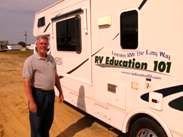Truck Campers are campers loaded and secured onto the bed of a pickup truck. This makes for a very versatile RV that can access back roads and remote areas other RVs can’t always get to. Truck campers are often times the choice of RV for avid outdoorsmen and women. A truck camper provides all the benefits of other RVs and still allows you to tow a boat, motorcycle trailer or horse trailer behind the truck.
Today’s truck campers come available in many different sizes and floor plans. They are built in 8, 9, 10 and 11 foot plus models. They come equipped with kitchen facilities, dining areas, bathrooms, and sleeping arrangements. Many manufacturers are making these campers more spacious by extending the cab-over area and adding slide-outs. Slide-outs are designed to provide additional living space inside an RV. Numerous options are available to include air conditioners and generators making the truck camper fully self-contained. You will need to have a truck that is capable of carrying the weight of the camper, so make sure you know the total loaded weight of the truck camper before purchasing the truck. When you’re not using the camper it can be removed from the truck.
Like most other RV types there are entry level models and deluxe models. There are also light-weight versions available. Construction methods vary from wood frame with corrugated aluminum sides to welded aluminum framing with fiberglass sides. Some manufacturers offer fold down versions of truck campers that are low profile and lighter for traveling. When you arrive at your destination you raise the roof for additional head room. A tent fabric similar to what is used on a pop-up attaches the roof to the hard sides of the trailer when it’s in the raised position.
Truck campers can sleep up to six people depending on the model, and prices range from $6,000 to over $26,000.
Truck Camper Pros
1) Access remote areas
2) Still able to tow a boat or trailer
3) With a generator you’re fully self-contained
4) Unload & use vehicle for transportation
Truck Camper Cons
1) Most require heavy duty truck
2) Limited space inside
3) Limited storage
4) Loading & unloading from vehicle
Happy RV Learning,
Mark Polk
RV Education 101
RV University
RV Orientation
Go for the RV Gold
Follow us on FACEBOOK
RV Consumer
RV Videos on Demand
Subscribe to:
Post Comments (Atom)






No comments:
Post a Comment